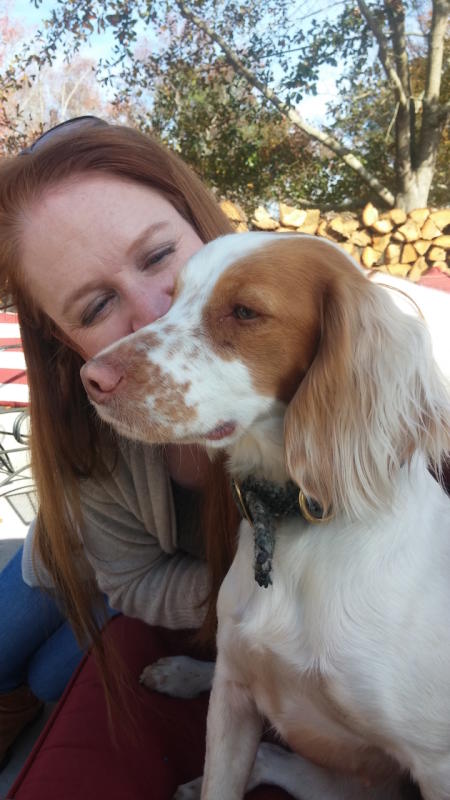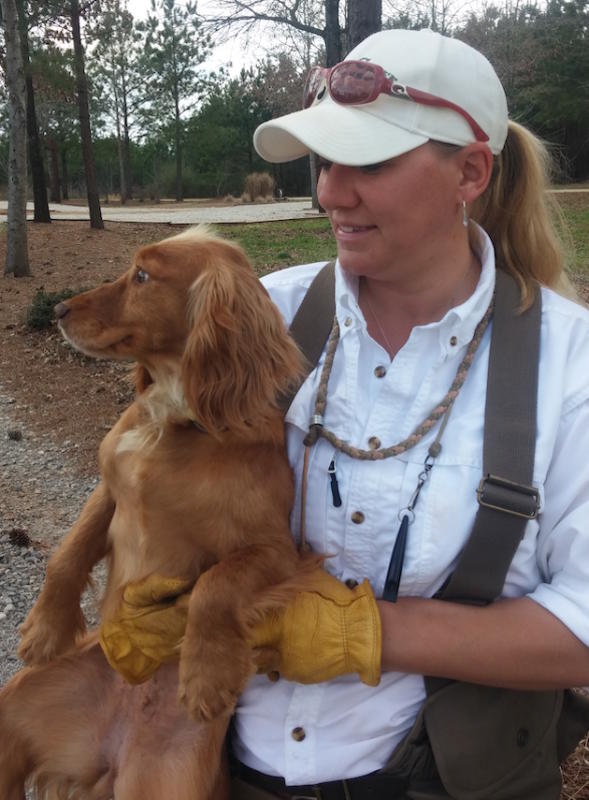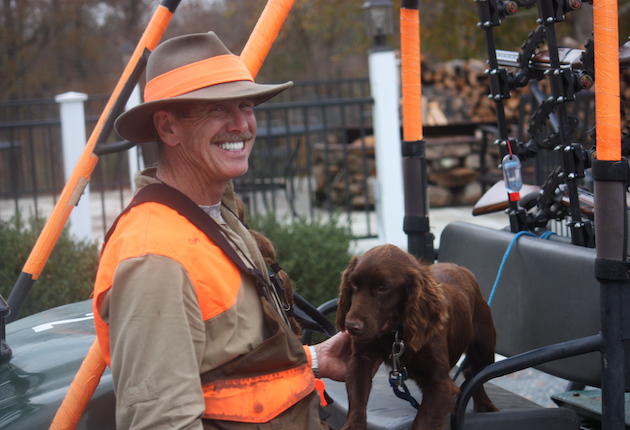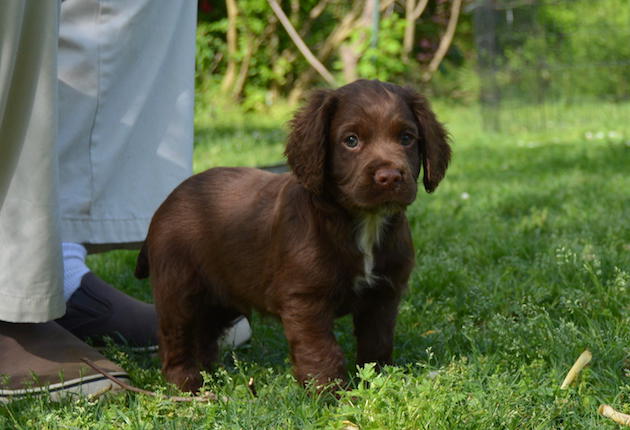Throughout my life I have seen a good number of cocker spaniels. Most were pets: carefully manicured, leashed, and walked on a sidewalk somewhere — anywhere. They were uninspiring at best, and I couldn’t believe they descended from hunting stock. Non-hunting Dachshunds still have chops, but not the cockers that had crossed my path.
But a couple of years ago one English field cocker caught my eye. She was average size for her breed, maybe in the mid-20-pound class and just over a foot off the ground. Her name was Bella, her owner was Danny Hawks from The Webb Farm, and she looked almost like a pint-sized setter. My wife, Angela, pointed her out, for she was smitten with the pup.

Angela Keer and Bella.
I remembered cockers I had previously seen, so I was more than skeptical when Danny cut her loose. She sat by his side and patiently awaited his command. When he finally gave it she erupted in a fury.
Bella, Italian for “beautiful,” showed no quarter or fear, and without hesitation she dived into the thickest patch of greenbriar I’d ever seen. The tangle was so dense it resembled a half-dozen rolls of concertina wire. Pointing dogs and Labs shied away from the jungle mess, but this little field cocker snaked her way in and around with all the moves of a belly dancer. I’d frequently lose sight of her and could only tell where she was by which section of greenbriar was shaking. Bella ultimately acquired her target, a covey of wild quail that believed if they stayed put they’d never have to leave.
How wrong they were.
Bella is an example of a recent and ongoing movement created by a handful of English field cocker devotees. While the name “cocker” stems from their initial use by British game keepers who used the stoic dogs for hunting woodcock, field cockers are gaining favor on commercial quail operations, for grouse hunting, as retrievers in driven and Continental shoots, and for many other flushing/retrieving scenarios.
Though field cockers have been an integral part of the British sporting world for well over a century, they have only had a small, albeit loyal, following on our side of the pond. To improve upon their breed, several savvy U.S. breeders have worked closely with British dog men to successfully deliver pups of the highest order. Over the years there have been a number of British invasions: the Redcoats’ arrival in Boston, the Beatles at JFK, and the Stones and The Who among other bands. But for a bird hunter, this British Field Cocker Invasion is a cause for celebration.
Dog men and women have known the name Gates and Milner for a very long time. Field Trial Hall-of-Famer John Rex Gates and his wife, Diane Deming Gates, (dianedeminggates@gmail.com) work with Robert Milner, the founder of Duck Hill Kennels to develop hard-hunting field cockers. You may know Milner as a highly acclaimed author of dog-training books and articles, as well as the original founder of Wildrose Kennels. Their working relationship includes Ian Openshaw, the legendary UK field trialer who recently set a British record that will be difficult, if not impossible, to beat: his 100th Field Trial Championship.
According to John Rex: “Field cockers are the smartest little dogs I’ve ever been around. Field cockers love to retrieve, they are easy to break, and they are great flushing dogs. All these dogs want to do is find birds and please their handler, and their drive and huntability knows no bounds.”
The team has been breeding UK sires and dames from some of the winningest stock. The Gates are pretty hot for a certain great young cocker owned by Milner: Mallowdale Lestyn (call name “Haggis”), whose sire has 37 UK Field Trial Champions in his five-generation pedigree.
“I love the attitude of the field cocker,” said Miss Diane. “When I watch a working dog I imagine they are thinking ‘I can do and I will do.’ Just when I think they’ve done it all they come up with a ‘Watch this!’ move that makes me smile.”

Tyla Kuhn and Willows Whispering Wish, call name “Willow.”
Bella came from Scott and Tyla Kuhn’s Sunsage Sporting Dogs (sunsagesportingdogs.com), so it was no surprise she was a tenacious dog. Her daddy was Blue Chip Quiet Rebel, the product of five generations of careful breeding that contained 12 English National Field Champions and 60 English Field Trial Champions. Her momma, Blue Chip Mocha, also had strong genes, which includes three English National Champions and 43 English Field Trial Champions.
The Kuhns develop their dogs for use guiding at some of the top commercial wingshooting operations in the country. They first ran cockers in 2006 at Highland Hills Ranch and they quickly favored the small, biddable flushers to larger Labs.
“The field cockers are a perfect compliment to the shorthairs we breed and train,” Tyla said. “They’re equally good in the early season heat as well as the later season cold. Our dogs retrieve any shot birds, from small Georgia bobwhite quail to large South Dakota pheasant. Their legs may be shorter than those of a pointing dog, but we haven’t found a bird that can out-run them.”
The Kuhns currently run their dogs at Cheyenne Ridge in the fall and at North Georgia’s Fishing Creek Farms in the winter. Their ultimate goal is to breed for consistent size, conformation, and huntability.
Jay Lowry, owner of Ryglen Gundogs (ryglengundogs.com) is another breeder using UK genetics to enhance field cockers for domestic use. Until recently Lowry was a long-time British Lab trainer/handler who spent more than a decade working with Mike Stewart, the owner of Wildrose Kennels. After a 2013 rabbit hunt with Ian Openshaw, Lowry shifted his focus away from Labs and directly towards field cockers.
“I was smitten from the first moment I watched field cockers work rabbits,” he said. “I loved their intelligence, how they handled and quartered, and especially how they navigated the diverse terrain found in an English countryside. On my return trip I realized that this intense, biddable breed was far more popular in the UK than here in the states. Soon thereafter I began sourcing dogs through Openshaw.
“My primary goal was to contribute to the cockers’ already strong hunting traits, so I initiated my breeding program with pedigrees stemming from established field trial winners. I began breeding with ‘winners’ instead of ‘champions’ to ensure that my focus remained on hunting- and not field-trial-dogs. Perhaps that is a key reason why my field cockers excel in real hunting situations.
“In time I plan to selectively add champion bloodlines with an objective of developing new field trial dogs. The difference is that a FTC must win two open stakes whereas a FTW must win only one.”
While Lowry focuses on long, successful lineages, his quest for the ultimate dog leads him to selectively breed with promising dogs of younger lines. An interesting sidebar is that his female Mallowdale Kim is the mother of one of the Queen of England’s field cockers, with which she hunts regularly.

The Webb Farm’s Danny Hawks with a cocker.
Field cockers are biddable hunting dogs gaining wide acceptance in the pointing dog/flushing dog scenario. Perhaps they are gaining in popularity because they naturally quarter, retrieve-to-hand, and follow hand signals. Dogs trained to “hup” will sit when called, thereby allowing hunters to catch up. Their steadiness to wing, flush, and shot is noble, and they sit patiently as birds take to the air.
In addition to being lights-out hunters, field cockers have manners — short-handle for the fact that they don’t fly remaining birds while gunners reload. Improving and augmenting the English field cocker breed for field trialing and hunting is the main goal of each breeding program. Thanks to the hard work of these breeders, hunters like you and I can find a pup that will put a smile on our faces.


Many of the FTC bred dog are absolute maniacs unfit in the house and requiring a heavy hand to control in the field. Jay Lowry correctly gets it, you have be Very selective with the U.K. Bred dogs you select for importing or breeding to. Not all FTC bred dogs are hyper beyond control – do your research and select well. Terrific hunters and super family dogs. Owned and hunted over them for 40 years.
All that and they’re not hard to look at either. I’d really like to own one someday.